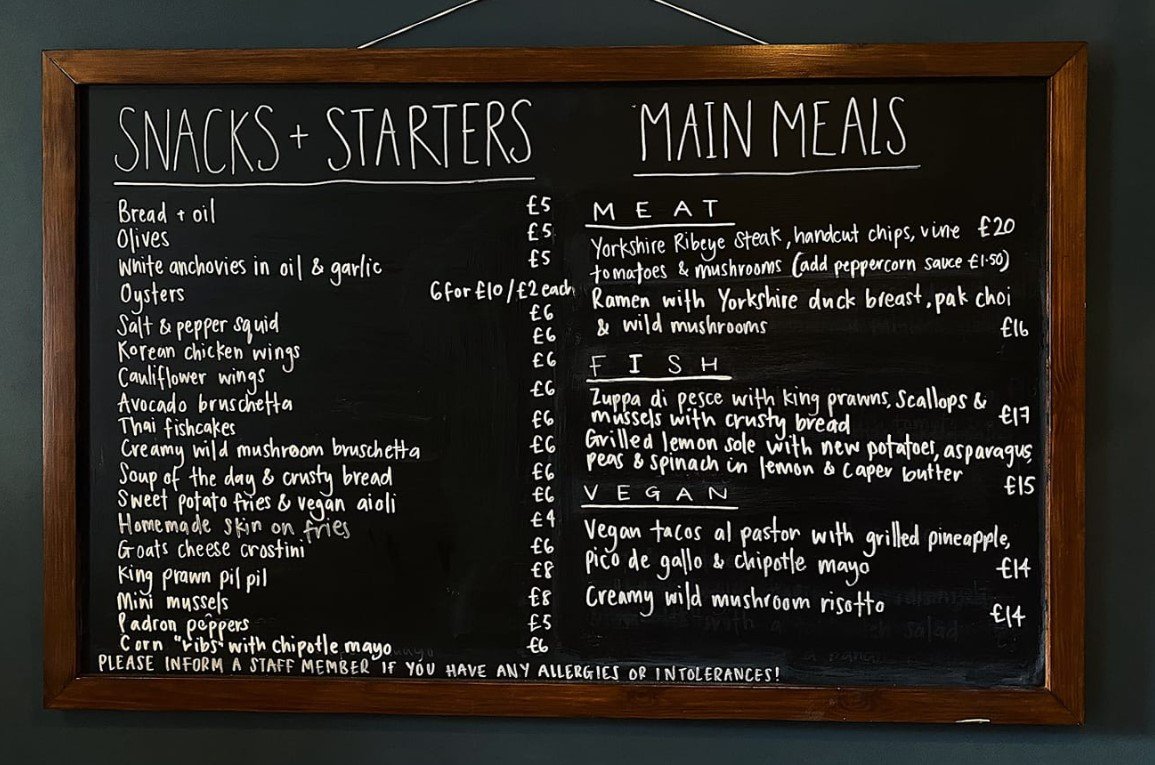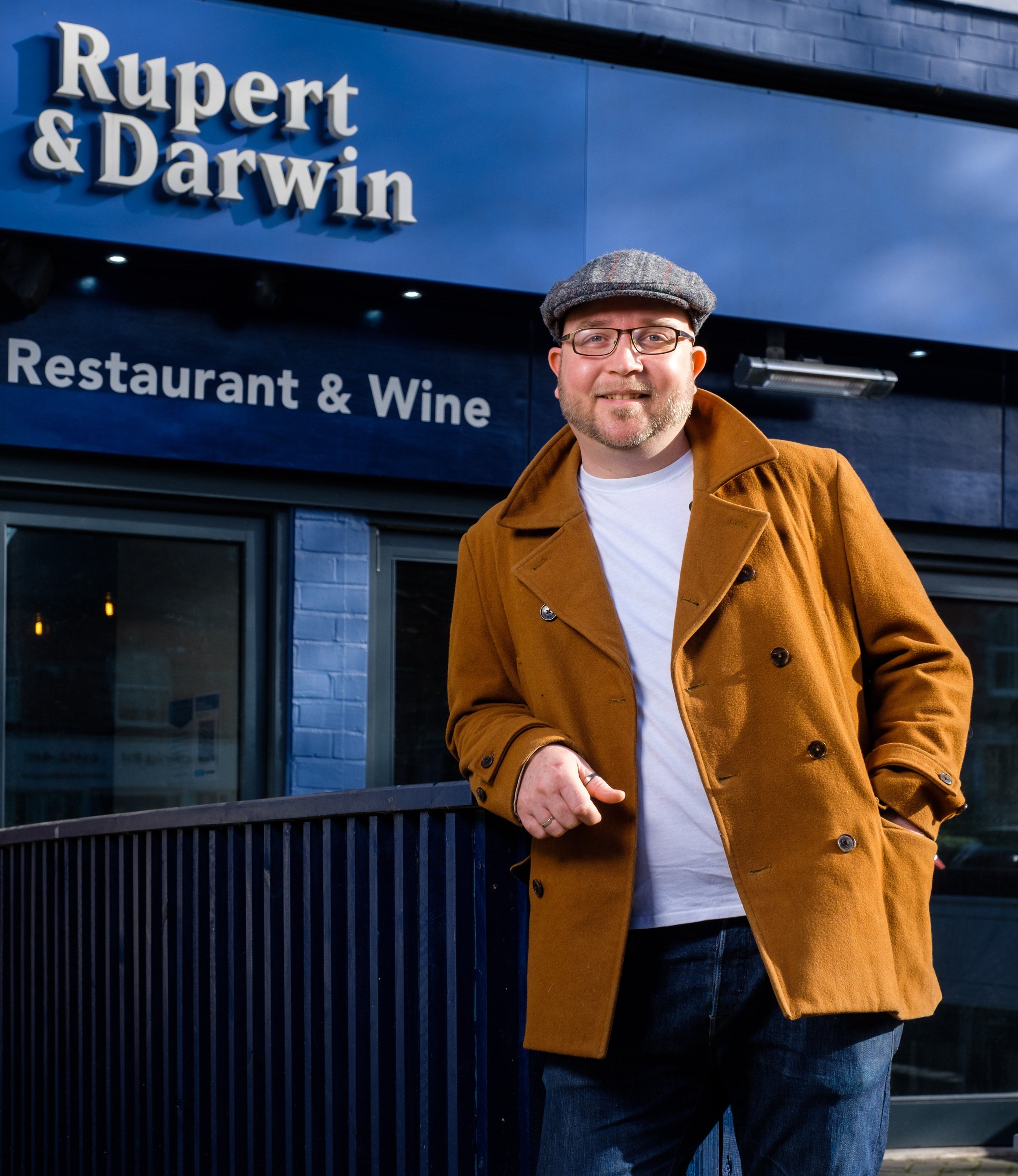‘Restaurants need support - they won’t survive without it’
‘PLACES THAT ARE CLOSING ARE NOT BADLY RUN OR MISMANAGED’: James MacLeod-Birch at Home
Chewing the Fat - out to lunch with Phil Ascough
This week’s guest: James MacLeod Birch
Lunch with James MacLeod-Birch brought to mind the return of Sir David Attenborough to our TV screens.
Restaurants are definitely an endangered species these days and James, most recently a director of the acclaimed Rupert & Darwin, knows more about them than most.
Before his role in raising the bar for restaurants along Princes Avenue, James ran 1884 Dock Street Kitchen. In partnership with his top teams, he’s a serial winner of the restaurant category in the Remarkable East Yorkshire Tourism Awards (REYTAs). With Rupert & Darwin a casualty of the economic climate, he’s lost to the hospitality sector, but hopefully not forever.
“I was not ready to go and run someone else’s restaurant for them,” he said.
“There was also the feeling that I can’t see it being a good arena to work in for a number of years because the economic crisis is going to get worse before it gets better.”
We met at Home, the wonderful restaurant which has gained recognition as a star of the local culinary scene since it was opened four years ago by Steve Shaw, who may be better know for his 12 years at Pave.
Tucked in next to the railway embankment at the corner of Beverley Road and De Grey Street, Home used to be open five or six days and nights a week. Now it’s down to three days and four nights, living within its means and quietly serving up excellent food in an environment which is, as you’d expect, homely.
There are maybe 30 seats inside and about the same outside. Shelves and walls are full of books, board games, records, prints and posters plus various kitchen implements from days gone by.
DINING OUT: James MacLeod-Birch out to lunch with Phil Ascough
There are also blackboards – loads of them – displaying the main menu which changes every fortnight and always comprises mains of two meat, two fish and two vegan. There’s also a long list of very tempting snacks and starters as well as a build-your-own brunch and lunch board.
The availability of the main menu at lunchtime turned me away from delving into those specials and towards a creamy wild mushroom risotto which was everything it claimed to be, and just the right size portion for me to resist dessert.
James chose the zuppa di pesce with king prawns, scallops and mussels served with crusty bread and at times looked as though he wanted to dive into it. A chap at a nearby table wandered over for a look and ordered the same. That’s all you need to know, and I took a picture of the board to remind me to watch out for it on future visits.
Live music on a Thursday evening and barbecues on summer Sundays are further evidence of a great destination making an effort and innovating to stand out, while also hoping for help.
A few days after our lunch, the new Prime Minister took up her post and signalled that she plans to address energy costs by still allowing prices to rocket, albeit in a limited and specific way.
And business confidence is unlikely to soar given the government’s commitment to claw back the cash it will pay to energy companies by topping up future taxes, which some might see as blocking off the light at the end of the tunnel.
UKHospitality responded with a call for VAT to be cut to 10 per cent and for another round of business rates relief.
They warned that energy bills and other rising costs “will prove too much to bear and hundreds of community assets will be shut and jobs lost unless additional support is brisk and bold”.
PASSION FOR SERVICE: James MacLeod-Birch has worked in hospitality for 26 years
You get the sense that even the industry’s trade body is understating the seriousness of the situation. Hospitality has taken successive hits in recent years, and a huge collective effort is needed to save it at a time when fewer people have the spending power to help.
Brexit had a negative impact on supply chains and staffing levels as well as on customer confidence, and all of that dates back to the referendum in 2016. Our region experienced a bit of a bounce as UK City of Culture, but there was a view at the time that the activity also created an over-capacity, which then led to closures as the big events disappeared.
Then came the pandemic, which multiplied the problems, and then war in Ukraine, limiting availability of essential ingredients and services and pushing up costs. This is where we are.
“The places that are closing are not badly run or mismanaged”, said James.
“They are great places with good reputations but the industry isn’t sustainable. We were crunching the numbers looking at staff and wages and what could be reduced but it didn’t make sense. For so many places the break-even is just too high.
“A lot of it is down to people coming straight out of the pandemic into a cost of living crisis and a lot of the industry is about repeat business. Before the pandemic we were full four days out of six every week. People were coming in week in week out and we would see the same people every week.
“A year after we reopened that had changed to people coming in every couple of months. The cost of produce had more than doubled since before the pandemic and we weren’t going to lower the quality.”
James will be 44 this month and has been in hospitality since he was 18, starting in pubs, training at chef school and working in Michelin Star establishments. His passion for service makes him acutely aware of the challenges facing the sector, and he completely understands why staff and customers have left.
A STAR OF THE LOCAL CULINARY SCENE: The menu at Home
“I had been used to doing 70 to 80 hours a week for most of the last 25 years – you get used to a long working week,” he said.
“Also, a lot of people who previously didn’t cook learnt how to do it during the pandemic and are now inclined to cook at home more often than they did before. There’s also a lack of money, lack of confidence, reticence from Covid, monkey pox, tomato flu… people are just very nervous and I can’t see it getting any better for a long time.”
Now in a senior business development role with Hull-based healthcare recruitment specialist Care Connection Partners, James is putting his transferrable skills to the test.
He said: “I was offered an opportunity to go into an industry that is doing well. They were looking for customer service skills, time management, people management, so all I have ever done.
“I’ve had to learn the products and the mechanics of how the company operates. We are a lifeline for a large number of care homes and for service users who have ongoing needs which are in jeopardy if a home is short staffed.
“We look after a large number of care homes and are expanding into Leeds. It’s a big area and a busy new arm of the business.”
Alongside the job comes a new freedom. James and his wife Beth are now able to enjoy more leisure time and are committed to using that to support local restaurants.
“We have a much better work-life balance. We made the decision a while ago that we would stop eating at chain restaurants and big groups because there’s nothing special about them.
HOPEFULLY NOT LOST TO HOSPITALITY: James MacLeod-Birch outside Rupert & Darwin
“Small independents need the support and they have more quality because they care more. You are not part of a corporate pool and the business owners have more passion about what they are doing. After we closed Rupert & Darwin we got the chance to eat at Social Distortion and it was one of the best meals I’ve had for a long time.”
Sadly, that was a farewell visit and there have been other closures. But there are also notable new arrivals including Hearth, launched in Trinity Square by a dynamic young team with Michelin Star experience, and Nostalgia, naff name but great food at the former Café Amici in Chanterlands Avenue now in the hands of Mata and Yiannis from The Greek and Artemis Greek Taverna.
We talk about the need for the businesses to set the highest standards and for customers to understand the cost of that, and to support the sector if they possibly can. The nine people who lost their jobs when Rupert & Darwin closed have all found new positions, but like James some have moved into other industries.
He said: “Hospitality is a luxury and a treat, it’s not essential and the gap between the quality of food at home and in a restaurant is narrowing so restaurants have to be better.
“There’s also a massive list of things to pay for before you get to a plate of food – energy bills, rent and rates, and staff costs, plates and glass and cutlery and produce. Talent and passion will always be there so the door is always open but confidence has taken a battering among colleagues and not just customers. Restaurants need support and they are not going to survive without it.”






